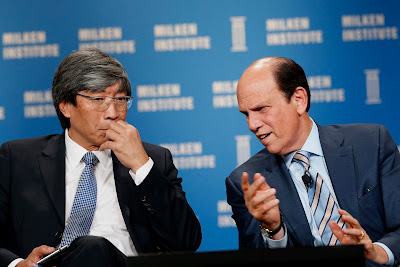
"We've had a great extended IPO window of opportunity for these companies to get financing from the public markets," said David Miller, portfolio manager at Alpine BioVentures, which invests in public and early-stage private companies. "Companies are going from their first human trials to FDA drug approval faster than ever," he said. "Part of that is the FDA is more understanding and companies are also smarter about drug development."
NantKwest plans to raise $151 million by offering 7 million shares at a price range of 20 to 23. At the midpoint it would have a fully diluted market value of $2.2 billion. That would top a record set by biotech Juno Therapeutics (NASDAQ:JUNO), with a market valuation of $2.16 billion before its trading debut on its Dec. 19 IPO, according to Renaissance Capital, manager of the Renaissance IPO exchange traded fund.
An Industry Of M&A
There are several reasons for the surge in health care initial public offerings. Helping fan the flames are a record number of mergers and acquisitions, including some blockbuster deals.
These include the $8.4 billion that big-cap biotech Alexion Pharmaceuticals (NASDAQ:ALXN) paid to acquire Synageva BioPharma in a deal that closed last month. Synageva came public in December 2011. Another was the $3.2 billion that Teva Pharmaceutical (NYSE:TEVA) paid to acquire Auspex Pharmaceuticals, in a May pact. Auspex came public in February 2014. Another big deal was the $7.2 billion that Celgene (NASDAQ:CELG) this month announced it would pay to acquire Receptos (NASDAQ:RCPT). Receptos came public in May 2013.
Another reason is the strong flow of money coming from venture capital firms, as well as IPOs and follow-on offerings. Analysts also say that biotech companies are innovating at a pace never seen before.
Billionaire Patrick Soon-Shiong (left), NantKwest's CEO, talks health care with Michael Milken at the Milken Institute Global Conference.
"We're now in a golden age of biotechnology," said Paul Yook, portfolio manager of the BioShares Biotechnology Products Fund (NASDAQ:BBP) and Biotechnology Clinical Trials Fund (NASDAQ:BBC). "The capital is widely available and a record number of drugs are being approved."
The venture capital industry pumped $2.3 billion into biotech companies in the second quarter, according to the MoneyTree Report by the National Venture Capital Association and PricewaterhouseCoopers. That's up 32% from the prior quarter and the largest amount since the group began keeping records 10 years ago.
The largest funding round for a biotech company in Q2 was $217 million received by Denali Therapeutics. That was followed by Aduro Biotech (NASDAQ:ADRO), which received $200 million, while Adaptive Biotechnologies got $195 million. Aduro came public on April 15, raising $119 million. The stock priced at 17 and popped 147% on its first day of trading. It now trades near 27.
"There have been a lot of takeovers with tremendous premiums that are enabling some of these biotech companies with good venture capital backing and good insider buying to be the next great wonder," said Scott Sweet, senior managing partner at IPOboutique.com, a research firm.
NantKwest has several key ingredients that make it a high profile IPO. Among them is that an affiliate of drug giant Celgene is an existing stockholder. It plans to purchase $17 million in NantKwest shares in a private placement concurrent with the IPO. Another existing stockholder is mutual fund giant Franklin Templeton, which intends to buy $45 million worth of shares.
Perhaps the biggest attraction to the attention-getting IPO is billionaire Patrick Soon-Shiong, chairman and CEO, and a physician, surgeon and scientist. He plans to invest $10 million in the IPO. Soon-Shiong previously acquired a controlling stake in the company last December, when it was known as Conkwest, for $48 million.
The Soon-Shiong Connection
Soon-Shiong has a long track record of success. In 2008 he sold a generic-drug company that he controlled, American Pharmaceutical Partners, to German health care company Fresenius for $5.7 billion.
He invented and developed Abraxane, which was approved by the Food and Drug Administration to treat metastatic breast cancer in 2005, lung cancer in 2012 and pancreatic cancer in 2013. Celgene acquired the drug in its $2.9 billion buy of Abraxis BioScience in 2010.
NantKwest is also drawing attention for its area of work. It's in the hot field of immunotherapy, which deploys the patient's own immune system to fight cancer.
"We are a pioneering clinical-stage immunotherapy company focused on harnessing the power of the innate immune system by using the natural killer cell to treat cancer, infectious diseases and inflammatory diseases," NantKwest said in its IPO prospectus. Natural killer cells are also called NK cells, hence the NK stock symbol.
Juno Therapeutics was perhaps the first high-profile IPO in the immunotherapy field. It priced at 24 and raised $265 million. Juno currently trades near 52.
Another is Kite Pharma (NASDAQ:KITE), which is up 300% from its June 2014 IPO price of 17. Kite now trades near 68.
The drug development field is also full of risk. Historically for every 100 drugs that enter the oncology pipeline, just eight get FDA approval.


No comments:
Post a Comment